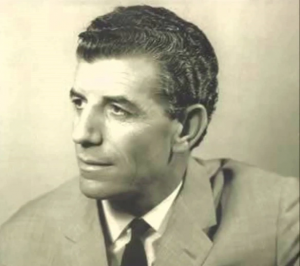Grigoris Bithikotsis the bard of Greek folk music
 Grigoris Bithikotsis was a great Greek singer, who gave to the folk music of Greece some of its most shocking moments, with his voice embraced post-war Greece, gave its own weight and its own popularity to his great works Mikis Theodorakis and became the catalyst for the lyrics of the poets Seferis, Elytis, Ritsos and Livaditis to reach the most secluded corners of Greece.
Grigoris Bithikotsis was a great Greek singer, who gave to the folk music of Greece some of its most shocking moments, with his voice embraced post-war Greece, gave its own weight and its own popularity to his great works Mikis Theodorakis and became the catalyst for the lyrics of the poets Seferis, Elytis, Ritsos and Livaditis to reach the most secluded corners of Greece.
Grigoris Bithikotsis was born on December 11, 1922 in Peristeri in Athens. He was the youngest son of a poor large family who struggled to make ends meet during the difficult years of the interwar period. In the storm of the second world war his brothers left for the Front, in Albania.
He stayed behind and practiced the profession of plumber. At the same time he was learning guitar and taking his first steps in singing in a tavern in his neighborhood. One cold night in the winter of 1937 he had heard Marco Vamvakaris, Manolis Chiotis and Stratos Pagioumtzis in a box and, as he said, his meeting with the former was the one that always moved him, because it changed his relationship with music.
In 1948 he met the great greek composer Mikis Theodorakis by chance in Keratea. There, a truck stopped, transporting political prisoners to Lavrio to be taken to Makronisos. There was a fountain and a switch soldier filled his hermit cage and gave them water to drink. This soldier was Grigoris Bithikotsis.
While serving his term in Makronisos, he wrote his first songs and in the evenings entertained the officers with the camp orchestra. After his dismissal, he formed his own band and in 1949 he entered the discography as a composer. Title of his first song “The Candle is trembling”, with lyrics by Charalambos Vassiliadis. In the song, Bithikotsis himself, together with Markos Vamvakaris.
His interpretations in the works of Mikis Theodorakis “The Epitaph” (“Where did my boy fly”, “My May Day you hated”), “Romiosini” (“The Bells Will Sign”), in poetry by Giannis Ritsos and “Axion Esti (“The sun of justice can be imagined”, “One swallow”), in poetry by Odysseas Elytis, sealed his presence in his Greek song and are considered unsurpassed.
An important moment in his great career was his collaboration with Manos Hadjidakis (“I am a goat without wings”, “The weather is gone”, “In Lavrio there is dancing”, “Speak to me” etc.) and with composers, such as Stavros Xarchakos (“Aponi Zoi”, Aspri Mera and for us), Apostolos Kaldara, Marko Vamvakari, Vassilis Tsitsani, George Mitsaki, Dimos Moutsis, Akis Panou and others.
He also wrote songs that became hits (“Official Favorite”, “The noon burns my forehead”, “A woman leaves”, “Doubts”, “Stu Belami ouzo”, “A car with two horses”, “Tou Botanikos the dude “etc.). For many years he appeared in the most famous secular centers of Athens and felt the joy of discovering new, very promising voices, among them Vicky Moscholou and Poly Panou.
During the dictatorship, his relations with Mikis Theodorakis were severely shaken, when, on July 13, 1967, he sang with Vicky Moscholou the Hymn of April 21 in “Deilina” of Glyfada. His excuse to Theodorakis was that he could not stand an exile at a time when his life was over. The two of them finally found each other again in March 2002 at the big concert in honor of Bithikotsis at SEF.
In January 2003, the President of the Republic Kostis Stefanopoulos awarded him the Golden Cross of the Order of the Phoenix. Honoring the popular bard, Kostis Stefanopoulos had stated that Grigoris Bithikotsis was “a great musician who expressed the misery and happiness, the pain and suffering of the Greek people.”
